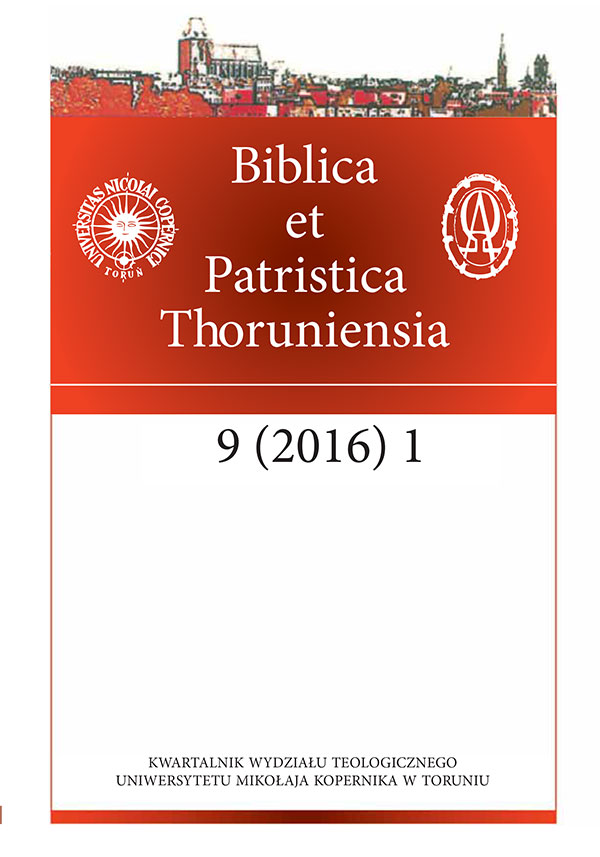Characteristic of Spiritual Person According to ‘Homilies on the Epistle of St. Paul to the Romans’ of St. John Chrysostom
DOI:
https://doi.org/10.12775/BPTh.2016.005Keywords
John Chrysostom, spiritual life, faith, the Holy Spirit, the fruit of the Holy Spirit, sinAbstract
The paper seeks to present the thought of Chrysostom theology and the way in which Christians are living the faith, paying special attention to the role of the Holy Spirit in shaping their life. The major issue that this study seeks to discuss is the collaboration between human aspect of existence and God's grace and answer the following question: what does it mean for a human being to live by the natural inclinations and what does it mean to live by the grace of the Holy Spirit? (por. Rz 8,8–15). To live by the natural inclinations means that one is adhering to mundane values, for instance, achieving excessive wealth or living in habitual sexual sin. To live by the Spirit means to follow the way of living which is based on joy and peace as foregoing may only be achieved when one understands the key factor of living by the Spirit, that be, the love – love for God and for people.References
I. Źródła
In epistulam ad Romanos homiliae PG 60, 391–682, tłum. T. Sinko, w: Św. Jan Chryzostom. Homilie na List św. Pawła do Rzymian, Tom I/1, Kraków 1995, s. 1–239; Tom I/2, Kraków 1998, s. 240–520.
Ad Demetrium de compunctione PG 47, 393–410.
Catecheses ad illuminandos 2 Sch 50bis, 133–150, tłum. W. Kania, w: Św. Jan Chryzostom. Katechezy chrzcielne, Lublin 1993.
In epistulam ad Hebraeos homiliae PG 63, 9–236, tłum. fragment: W. Kania, „Vox Patrum” 16 (1996) t. 30–31, s. 147–148.
In illud: Propter fornicationes autem unusquisque suam uxorem habeat PG 51, 207–218, tłum. T. Krynicka, „Vox Patrum” 31 (2011) t. 56, s. 583–595.
In Matthaeum homiliae PG 57, 13–90. 175–472 oraz PG 58, 471–794; tłum. J. Krystyniacki, w: Św. Jan Chryzostom. Homilie na Ewangelię według św. Mateusza, ŹMT 18, Kraków 2002 (homilie 1–40), oraz ŹMT 23, Kraków 2003 (homilie 41–90).
II. Opracowania
Altaner B., Stuiber A., Patrologia, tłum. P Pachciarek, Warszawa 1990.
Baron A., Przedmowa, w: Św. Jan Chryzostom. „Homilie na List św. Pawła do Rzymian”, Kraków 1995, s. 24–30.
Częsz B., Jan Chryzostom – teolog, „Teologia Patrystyczna” 5 (2008), s. 7–12.
Kaczmarek S., Miłość przebaczająca i jednocząca w świetle Homilii na Ewangelię wg św. Mateusza św. Jana Chryzostoma, „Verbum Vitae” 18 (2010), s, 213–244.
Kania W., Caritas u św. Jana Chryzostoma, „Vox Patrum”16 (1996) t. 30–31, s. 141–150.
Kelly J. N. D., Złote usta. Jan Chryzostom – asceta, kaznodzieja, biskup, tłum. K. Krakowczyk, Bydgoszcz 2001.
Ordon H., Zapowiedź udzielenia Ducha Ludowi Bożemu w Ez 36, 24–28, „Roczniki Teologiczne”, t. 52, zeszyt 1–2005, s. 43–53.
Paczkowski M., Duch przychodzący i działający Dz 2, 1–3 w egzegezie homiletycznej Jana Chryzostoma, „Biblica et Patristica Thoruniensia” 1 (2008), s. 229–261.
Paczkowski M., Powinności bogatych wobec ubogich. Stanowisko Jana Chryzostoma i Leona Wielkiego, „Teologia Patrystyczna” 10 (2013), s. 107–143.
Padovese L., Wprowadzenie do teologii patrystycznej, tłum. A Baron, „Myśl Teologiczne”, Kraków 1994.
Studer B., Teologia Patrystyczna, w: Historia Teologii I. Epoka patrystyczna, red. A. Di Berardino, B. Studer, Kraków 2010, s. 619–634.
Szczur P., Cele chrześcijańskiego małżeństwa w nauczaniu Jana Chryzostoma, „Vox Patrum” 29 (2009) t. 53–54, s. 95–111.
Szczur P., Problematyka społeczna w późnoantycznej Antiochii. Na podstawie nauczania homiletycznego Jana Chryzostoma, Lublin 2008.
Szczur P., Rola postrzegania duchowego w nauczaniu katechetycznym Jana Chryzostoma, „Vox Patrum” 34 (2014) t. 62, s. 493–504.
Szczur P., Warunki wysłuchania modlitwy indywidualnej na przykładzie modlitwy Dawida w „Objaśnieniach Psalmów” św. Jana Chryzostoma, „Homo Orans” 10 (2011), s. 17–37.
Špidlík T., Gargano I., Grossi V., Historia duchowości. Tom III. Duchowość Ojców Kościoła, tłum. K. Franczyk, J. Serafin, K. Stopa, Kraków 2004.
Uciecha A., Grzechy główne i metody walki z nimi w Homiliach św. Jana Chryzostoma na I List św. Pawła do Koryntian, „Vox Patrum” 21 (2001) t. 40–41, s. 247–262.
Widok N., Troska Jana Chryzostoma o grzeszników, w: Czasy Jana Chryzostoma i jego pasterska pedagogia, red. N. Widok, OBT 105 (2008), s. 233–244.
Wiseman J. A., Historia duchowości chrześcijańskiej, tłum. A. Wojtasik, Kraków 2009.
Zagórski D., Miłość (¢g£ph) w Homiliach św. Jana Chryzostoma na List do Rzymian, „Biblica et Patristica Thoruniensia” 3 (2010), s. 149–158.
Zagórski D., Współpraca człowieka z łaską Bożą w ujęciu Jana Chryzostoma, „Teologia Patrystyczna” 5 (2008), s. 27–47.
Żurek A., Bóg miłosierny i do miłosierdzia wzywający, „Teologia Patrystyczna” 5 (2008), s. 13–26.
Downloads
Published
How to Cite
Issue
Section
License
CC BY ND 4.0. The Creator/Contributor is the Licensor, who grants the Licensee a non-exclusive license to use the Work on the fields indicated in the License Agreement.
- The Licensor grants the Licensee a non-exclusive license to use the Work/related rights item specified in § 1 within the following fields: a) recording of Work/related rights item; b) reproduction (multiplication) of Work/related rights item in print and digital technology (e-book, audiobook); c) placing the copies of the multiplied Work/related rights item on the market; d) entering the Work/related rights item to computer memory; e) distribution of the work in electronic version in the open access form on the basis of Creative Commons license (CC BY-ND 3.0) via the digital platform of the Nicolaus Copernicus University Press and file repository of the Nicolaus Copernicus University.
- Usage of the recorded Work by the Licensee within the above fields is not restricted by time, numbers or territory.
- The Licensor grants the license for the Work/related rights item to the Licensee free of charge and for an unspecified period of time.
FULL TEXT License Agreement
Stats
Number of views and downloads: 747
Number of citations: 0



